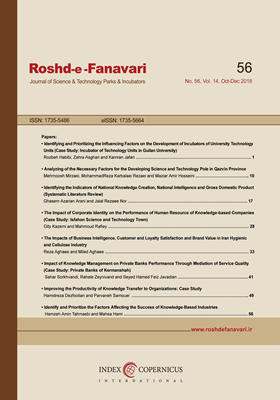-
-
List of Articles
-
Open Access Article
1 - The Impacts of Business Intelligence, Customer and Loyalty Satisfaction and Brand Value in Iran Hygienic and Cellulose Industry
Reza Aghaei Milad Aghaee -
Open Access Article
2 - Improving the Productivity of Knowledge Transfer to Organizations: Case Study
parvaneh samoei hamidreza dezfoolian -
Open Access Article
3 - Impact of Knowledge Management on Private Banks Performance Through Mediation of Service Quality (Case Study: Private Banks of Kermanshah)
sahar sorkhvandi Rahele zeynivand seid hamed feizjavadian -
Open Access Article
4 - Identifying the Indicators of National Knowledge Creation, National Intelligence and Gross Domestic Product (Systematic Literature Review)
Ghasem Azari Arani jalal rezaeenour -
Open Access Article
5 - The Impact of Corporate Identity on the Performance of Human Resource of Knowledge-based Companies (Case Study: Isfahan Science and Technology Town)
giti kazemi Mahmoud Rafie -
Open Access Article
6 - Identify and Prioritize the Factors Affecting the Success of Knowledge-Based Industries
Hamzeh Amin-Tahmasbi Mahsa Hami -
Open Access Article
7 - Analyzing of the Necessary Factors for the Developing Science and Technology Pole in Qazvin Province
mehrnoosh mirzaei mohammad reza karbalaei rezaei maziar amirhosseini -
Open Access Article
8 - Identifying and Prioritizing the Influencing Factors on the Development of Incubators of University Technology Units (Case Study: Incubator of Technology Units in Guilan University)
Roozbeh Habibi Zahra Asghari Kamran Jafari
-
The rights to this website are owned by the Raimag Press Management System.
Copyright © 2017-2026







